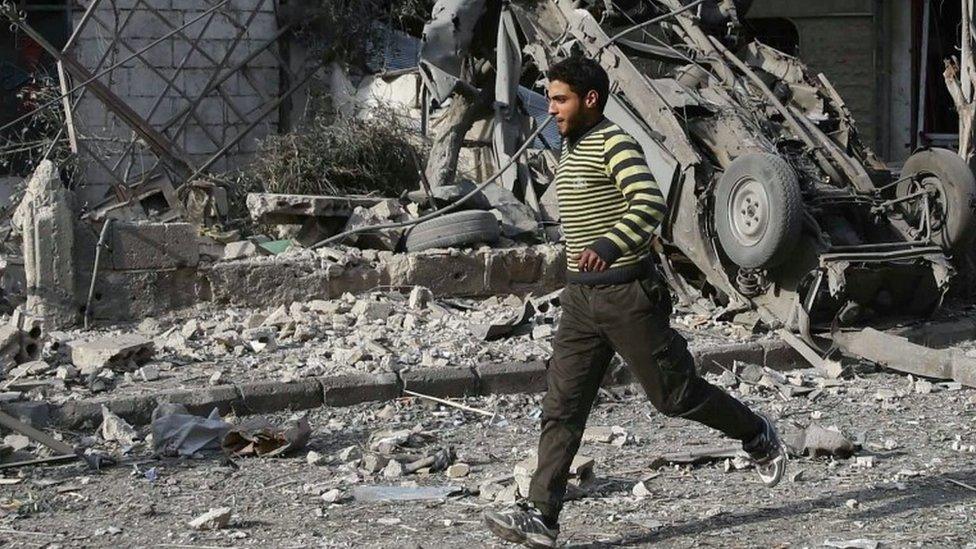Syria war: New UN truce plea as deaths in Eastern Ghouta mount
- Published
A doctor in Eastern Ghouta says there is still shelling, but "the level is less than before"
The UN has renewed its appeal for an immediate truce in the besieged Syrian rebel-held Eastern Ghouta area, amid reports of more deaths in air strikes.
The UN Security Council demanded on Saturday that all parties cease fighting for 30 days "without delay".
But the Syrian government's ally Russia said the truce would begin only once they had agreed how to implement it.
It came as activists reported that nine civilians were killed in a government air strike on the town of Douma.
At least 541 people have been killed by government air and artillery strikes since hostilities escalated eight days ago, according to a medical charity.
The Eastern Ghouta is the last major rebel-held area near the capital, Damascus, and has been besieged since 2013 by the Syrian military with support from Russia and Iran-backed militias.
What is happening now in the Eastern Ghouta?
Reports on Monday morning spoke of renewed bombardment of the enclave, where some 393,000 civilians are trapped.
The Syria Civil Defence, whose rescue workers are known as the White Helmets, said nine civilians were killed in a strike on one building in Douma. A monitoring group said the victims were from the same family.
The official Sana news agency meanwhile cited police as saying a civilian had been injured in the government-controlled Qassa area of Damascus by shells fired by rebels in the Eastern Ghouta.

On Sunday, at least 20 civilians were killed in government air and artillery attacks, according to the Union of Medical Care and Relief Organizations (UOSSM), a charity that operates hospitals in the enclave.
Casualties were also reported following what the opposition newspaper Enab Baladi reported was a ground offensive by pro-government forces that rebels repelled.
What has the UN said?
Addressing the UN Human Rights Council in Geneva, UN Secretary-General António Guterres said Security Council resolutions were "only meaningful if they are effectively implemented and that is why I expect the resolution to be immediately implemented and sustained".
Rawaa has been living in a basement with around 75 others for months
He added: "Eastern Ghouta cannot wait. It's high time to stop this hell on Earth."
The UN Security Council resolution demanded that "all parties cease hostilities without delay" and ensure "a durable humanitarian pause for at least 30 consecutive days throughout Syria".
The resolution was agreed to enable humanitarian aid deliveries and medical evacuations of the critically ill, external, but operations against the jihadist groups Islamic State (IS), al-Qaeda and what the resolution terms al-Nusra Front are not covered by the truce.
Al-Nusra Front was the name of al-Qaeda's former official affiliate in Syria. Its latest incarnation is an alliance of jihadist groups called Hayat Tahrir al-Sham (HTS).
HTS has a presence in the Eastern Ghouta, but the enclave is dominated by the Islamist rebel groups Jaysh al-Islam and Faylaq al-Rahman.
EU foreign policy chief Federica Mogherini on Monday called on the Syrian government and its supporters to ensure the process of de-escalation took place.
Russian Foreign Minister Sergei Lavrov said the cessation of hostilities would "start when all sides of the conflict agree on how to introduce it".
The Syrian government has denied targeting civilians and said it is trying to liberate the Eastern Ghouta from "terrorists" - a term it has used to describe both the jihadist militants and the mainstream rebels.
How bad is it in the Eastern Ghouta?
One doctor, who gave his name as Dr Jad, told the BBC medics were working with "no electricity, no medication, no oxygen, bombs, no medication for anaesthesia, no painkillers, no antibiotics".
"At least in heaven there's food": The children caught up in Eastern Ghouta air strikes
He added: "They are working in a really, really dreadful, difficult situation; it reminds us of the First World War."
The Syrian Network for Human Rights group, which tracks casualties, says 12,763 civilians have died as a result of attacks by Syrian government forces and their allies in the Eastern Ghouta since March 2011, when the Syrian civil war began.
Was there a chlorine attack on Sunday?
Ambulance drivers reported a chlorine smell after a bombardment air strike in the town of al-Shifuniya.
Workers within the opposition-run health ministry said there had been admissions on Sunday of people suffering symptoms consistent with exposure to chlorine gas.
They said 18 people had been treated "with oxygen nebulising sessions", that one male infant had died, and that a four-month-old baby was on a ventilator.
Allow X content?
This article contains content provided by X. We ask for your permission before anything is loaded, as they may be using cookies and other technologies. You may want to read X’s cookie policy, external and privacy policy, external before accepting. To view this content choose ‘accept and continue’.
It was unclear whether the boy's death was related to gas or the explosion.
The Syrian American Medical Society, a relief organisation, also told the BBC there were patients "suffering from symptoms indicative to exposure to chemical compounds".
None of reports could be independently verified.
Mr Lavrov said on Monday that "bogus stories" about the use of chlorine were a "provocation" intended to sabotage the UN resolution.
The Syrian government has repeatedly denied using chemical weapons.
However, a joint investigation by experts from the UN and the Organisations for the Prohibition of Chemical Weapons concluded two years ago that government forces had used chlorine as a weapon at least three times between 2014 and 2015.
The experts are also confident that government forces used the nerve agent Sarin in an attack on the northern rebel-held town of Khan Sheikhoun last April, killing more than 80 people.
- Published24 February 2018
